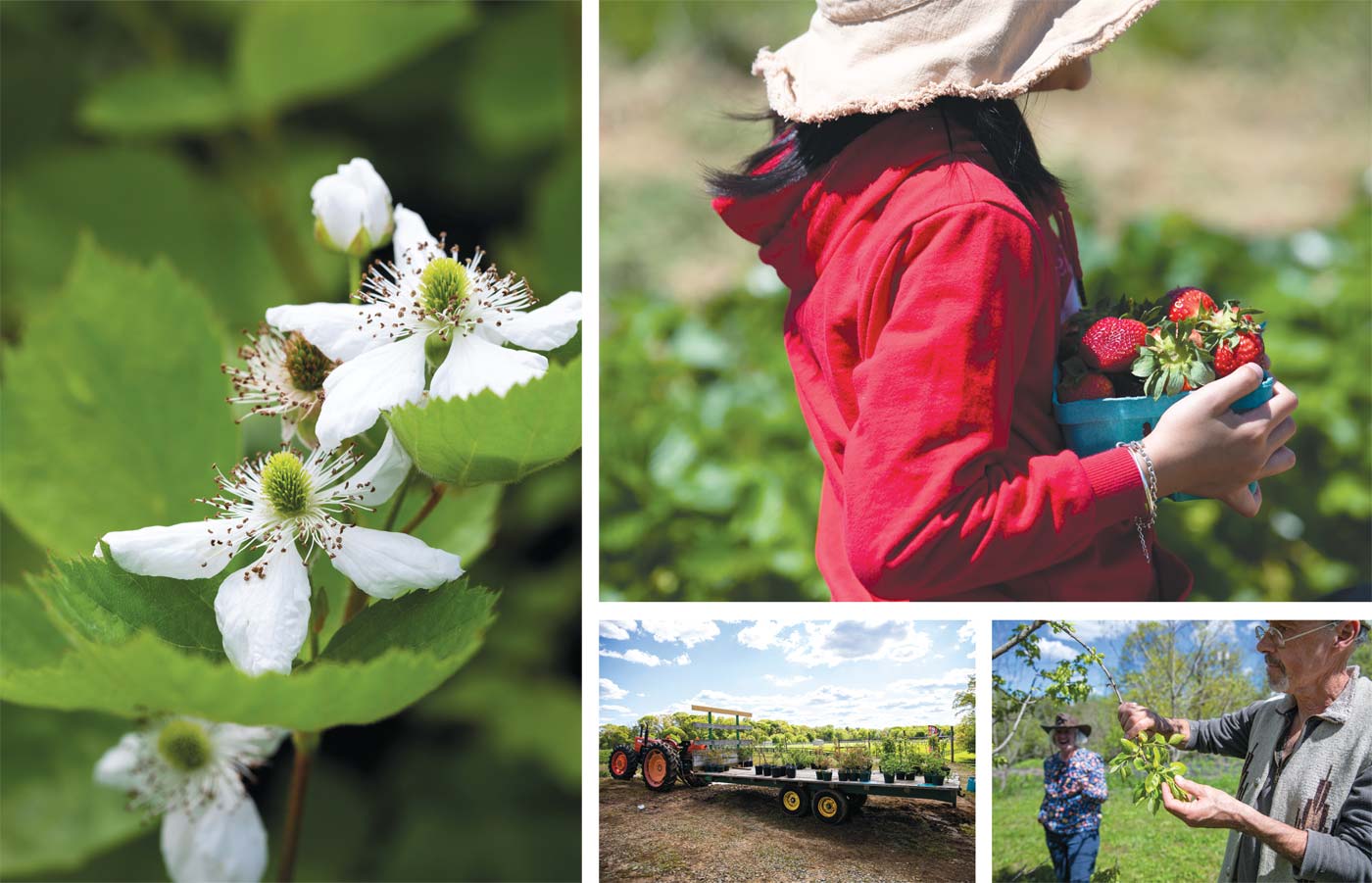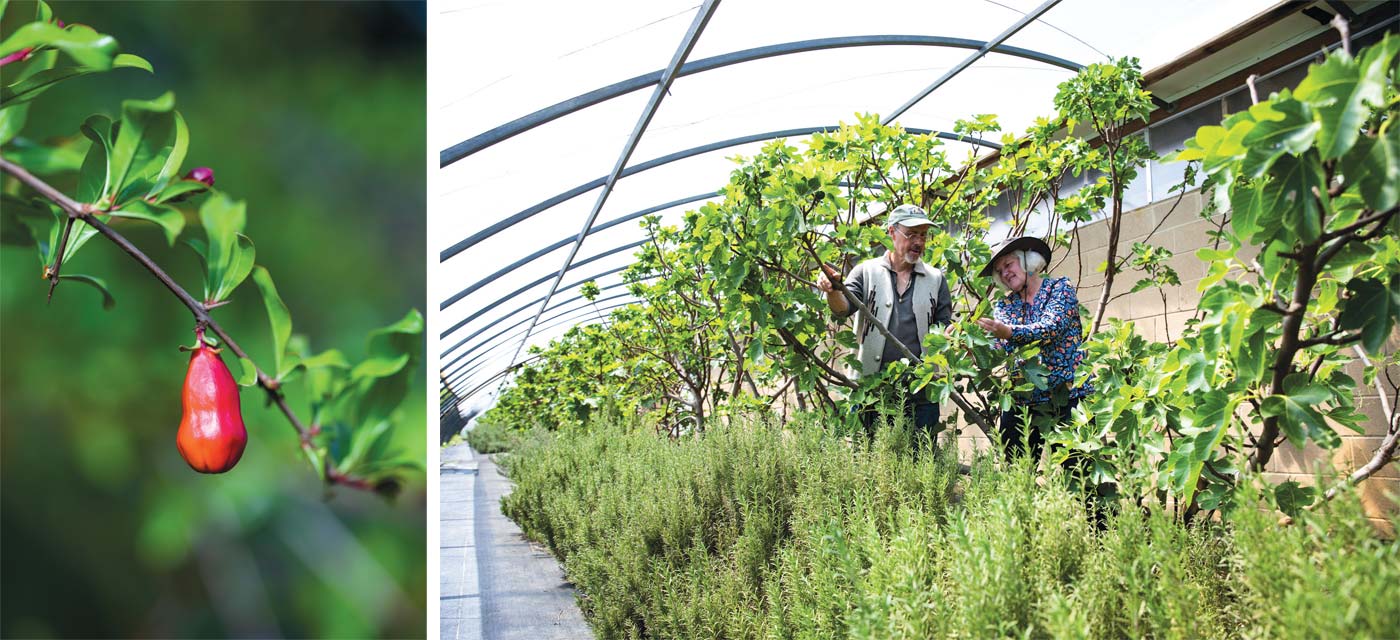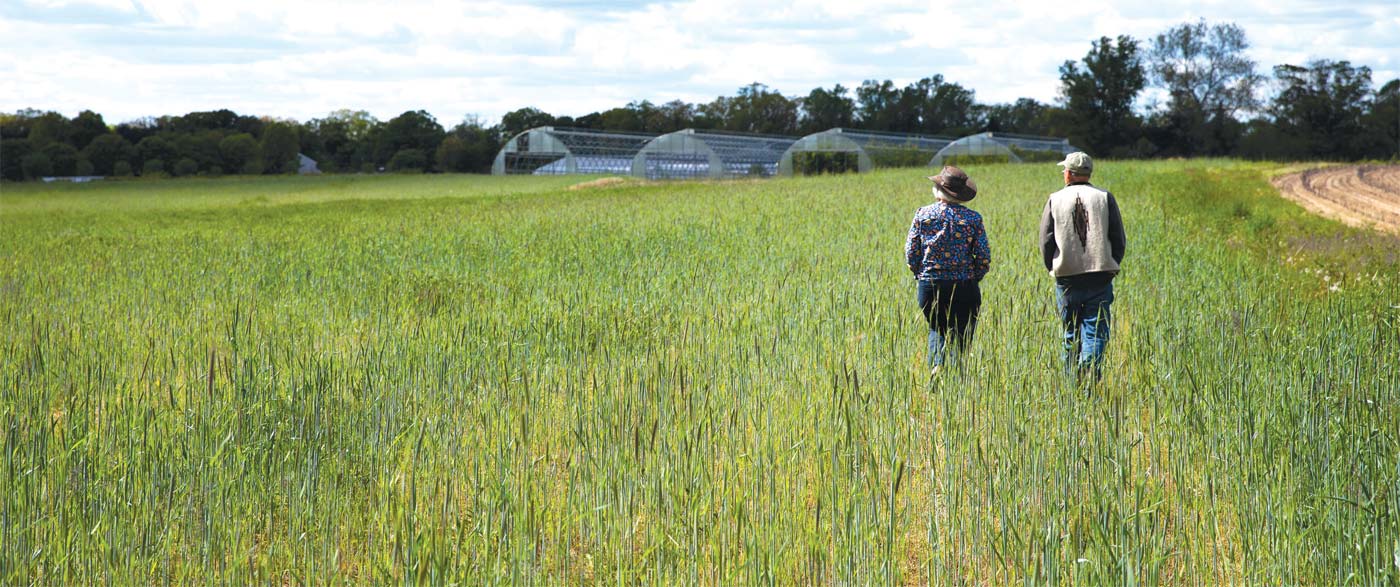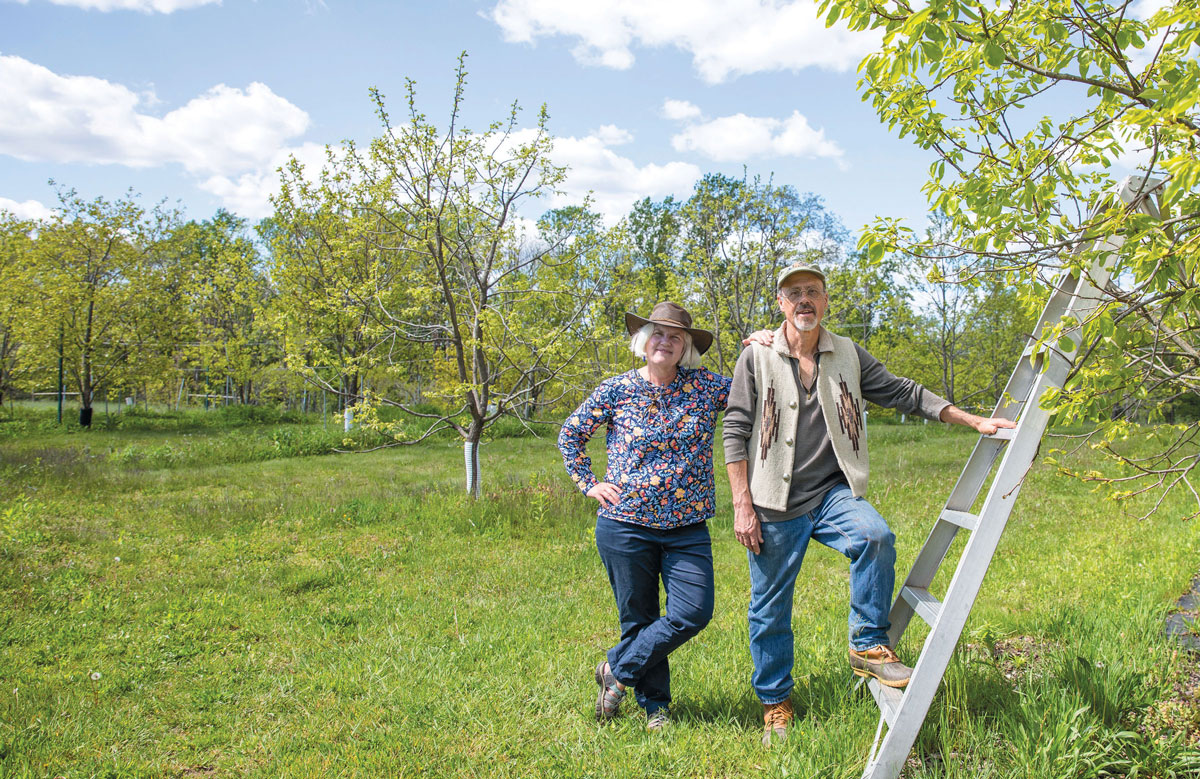Retooling Reality: A New Day at Chesterfield Organic Orchards
On Chesterfield Organic Orchard’s Facebook page, farmer Sherry Dudas posts updates on availability of their organic fruits, collaborations with other farmers, and upcoming on-farm events. The social media feed is full of photos showing budding trees, open fields, and baskets of just-picked fruits.
Those upbeat images, however, are tempered by more sobering posts in which Dudas links to news stories about South Jersey farmers who are struggling to survive or calling it quits after generations. As owners of the now-defunct Honey Brook Organic Farm—once one of the largest community-supported agriculture (CSA) harvest subscription programs in the nation—Dudas and her farmer-husband Jim Kinsel know firsthand how urgent it is to engage residents in the challenges faced by Garden State farmers. And their path to specializing in pick-your-own certified organic fruit was shaped by their memories, as CSA pioneers, of those early, heady days when CSA farmers and members felt united in a mission to create a new and better food system.
After training with New Jersey organic farming legends Ed Lidzbarski of E.R. & Son Farm in Jamesburg and John Canright of Farmer John’s Organic Produce in Warren Township, Kinsel took over the management of the Watershed Organic Farm in Pennington in 1991. There, he and a short-lived business partner started what Kinsel believes was the second CSA farm in New Jersey. (Genesis Farm was the first). His first year he had 50 members, drawn from the Stony Brook-Millstone Watershed Association’s membership.
Having briefly considered the idea of farming with horses—a skill he learned at the Howell Living History Farm in Lambertville—Kinsel chose instead to scale up.
“I was 32 when I started and realized that I no longer had that stupid youthful vigor where I could do it all myself,” Kinsel says with a laugh. “I did think that, over time, organic farms would look more like conventional farms, in terms of their equipment and staff. Why wouldn’t I buy a tractor with the idea that I would build the scale of the business?” Scaling up also furthered his goal of bringing good food to a large number of people at an affordable price.
Although there are debates around the origin of CSA, the philosophy and model are best exemplified by Clientele Membership Clubs, first proposed in the 1970s by Booker T. Whatley, the visionary Tuskegee Institute professor of agriculture who earned his doctorate in horticulture from Rutgers University. Clientele Club members paid farmers up front for a season’s worth of pick-your-own produce—giving farmers a guaranteed market, lower labor expenses, and much-needed pre-season cash to pay for seeds and supplies. The goal was small-farm viability through a direct, committed relationship between a farmer and his or her customers. The CSA model took root in New England in the 1980s, where the commitment of shared risk and shared reward helped rebuild bonds between farmers and their communities.
Kinsel’s CSA grew quickly and by the late 1990s he added boxed-share deliveries to Philadelphia members via the South Street Farmers Market and gourmet food purveyor Assouline & Ting. He later added a Boxed Share Community Drop Off program that allowed members to pick up pre-packed boxes of produce at locations in Princeton, Highland Park, Maplewood, and Summit.
Dudas joined Kinsel on the farm in 2003, leaving her career at the State of New Jersey where she worked in open space and farmland preservation. The name was changed to Honey Brook Organic Farm CSA and, over the years, membership continued to grow. “During those times, we were doing a lot of events,” Dudas says. “We did food demos—we always had chefs that wanted to share their talents. And for years we had our sauerkraut demo. I think we did a good job of building community at a time when our area wanted at least one aspect of their lives to be a food community that was built on a farm.”
Faced with long waitlists for membership year after year, Dudas and Kinsel bought two farm properties in Chesterfield in 2007 and 2008. The location, 20 miles south of the Watershed property, meant a longer growing season. This allowed them to expand production while also mitigating potential risk due to pests or extreme weather affecting specific crops at one of their farms.
During the growing season, those CSA members who picked up their share at the Watershed farm location came once a week to gather produce in the farm store and fields. With thousands of members visiting the farm, Kinsel and Dudas began experiencing violations of the honor system. “It was really unsupervised. We had little placards that told you what to take depending on your share,” Kinsel says. “There is a certain element that attempts to game a system. It built over time to where we had notorious incidents, like a woman bringing in a baby carriage and stuffing it full of eggplant.”
Even though there was no shortage of new members waiting to join, Dudas and Kinsel were deeply concerned about the impact that witnessing theft had on existing members and on the ethos of shared commitment that was, for them, at the heart of the CSA movement.
“You have totally honest, totally supportive members. They totally get it,” Kinsel says. “And then they see that there are other people who are not really buying into the community aspect. So, we did start to lose some of those true believers. We were losing people and we were losing the whole spirit of the CSA.”
They took steps to better supervise the pickup process and the Honey Brook CSA continued to grow and be profitable. By 2016, Kinsel was farming 140 acres of produce across four locations—the farm on the Watershed property, rented land in Pennington, and the two Chesterfield farms. “We reached a peak in 2016 with about 4,000 memberships. We estimate that was probably [serving] about 10,000 people.” Dudas says. “We kept changing with the times in terms of offering different-size shares. And we were doing the box share delivery program to various cities.”
UNDER THE NEW NAME CHESTERFIELD ORGANIC ORCHARDS AND NURSERY, THEY TURNED THEIR ATTENTION TO ORGANIC FRUIT PRODUCTION—A LESS COMMON AND HIGHLY DESIRABLE LOCAL CROP.

Then, in 2017, that upward trajectory ended. For the first time in their history, Dudas and Kinsel lost members and money.
“It never happened to us before,” Dudas says. “By May, we knew our numbers were down. I started blasting emails—and people started asking to be taken off our email list. When the dust settled, we were down 500 members. And then I actually went into a depression for the first time in my life. I got this thing in my head—what if we ran out of money at the end of the season?”
Dudas and Kinsel tried to understand how everything could have changed so quickly. Was it because the summer of 2016 was so brutally hot? Or were people changing their buying habits because of the rising popularity of meal kit delivery services, such as Blue Apron? Were there too many CSA programs in the state or too many non-farm businesses co-opting the language of local? Or was organic produce—a rare product when Kinsel started farming—now so common that the importance of local was getting lost?
Honey Brook CSA was not alone in its declining membership. Around this time, CSAs throughout the U.S. were reporting steady declines, which various national news media attributed to the ubiquitousness of organic produce, consumer desire for greater convenience and choice, and the rise of non-farm delivery programs that used the term CSA, but that, in fact, acted as middlemen—”precisely what,” the New York Times noted in a July 2016 article, “traditional CSAs are designed to avoid.” With “buy from local farmers” as the selling point, these box delivery programs lack the benefits to farmers that traditional CSAs provide: up-front money to prep for the growing season and a committed customer base that has direct connection to, and concern for, a farmer.
Dudas and Kinsel took steps to make up the loss. They added smaller share options. And, thinking that limited choice might be a reason behind the decline in membership, they added a Choice Box program, which allowed members to fill their box with whatever produce they wanted.
Taking advantage of lengthening growing seasons and their crew’s desire to continue working beyond Thanksgiving, they planted an extra season of cold-weather crops and offered a winter CSA. This ended their tradition of allowing members to glean the fields at the end of the 26-week season—a move that angered some members who felt that Dudas and Kinsel were reselling produce that rightfully belonged to them.
In partnership with other farmers and vendors, they also created a winter farmers market in 2018 that ran from December through May on the Watershed farm property. The market was held again in 2019 and 2020. “That turned out to be really successful,” Dudas says. “The vendors did really well. We sold extra produce, but it didn’t result in us selling more CSA shares. The better outcome was that we started networking with other farmers. It was well received by our farm members. And we were offering an opportunity for non-farm members to get onto the Watershed Farm, which is a beautiful farm.”
KINSEL WAS FARMING 140 ACRES OF PRODUCE ACROSS FOUR LOCATIONS. “WE REACHED A PEAK [WITH THE CSA] IN 2016 WITH ABOUT 4,000 MEMBERSHIPS.”

In its simplest, idealized form, a CSA farmer divides the weekly harvest among the members, which means some weeks there are lots of greens and others there is a wide variety of produce. Recognizing that this seasonal flow might be challenging to home cooks, Dudas and Kinsel eventually signed a contract with an online ordering platform that allowed all members to create customized shares. “We recognized that the consumer was changing,” Kinsel says, “that it was no longer 1992.”
The decision was well timed as the arrival of Covid three months later threw the food world into a state of disarray. The online platform allowed them to serve a larger market, including nonCSA members. And they added 1,000 new CSA members that year. “We really staffed up,” Dudas says. “We did home delivery and we had a crack staff. A lot of those college kids who were being sent home early from school were calling us up saying ‘We want to help!’ We were packing boxes like we were Santa’s workshop.”
Even with new members, increased sales, and PPP payments, they continued to lose money. The next year, many of the 1,000 new members didn’t return and the high cost of labor, farmland rental, and home delivery made it clear that changes were required. The online platform proved, too, to be unprofitable. “Basically, their percentage of sales was our profit margin,” Kinsel says. “They made more money than we did.” The fact that members pre-paid and then spent down their payment also removed the foundational idea of CSA—shared risk, shared reward—instead placing all of the risk onto the farmer. At the close of the 2021 season, they ended their tenure at the Watershed farm, sold one of their farm properties in Chesterfield, and closed their 2,500-member CSA, which by that time had more than 25 community and workplace drop points.
To wrap up the CSA, Dudas and Kinsel helped their long-time field crew find employment at other farms and sent their members a list of other local CSA farms. Then, under the new name Chesterfield Organic Orchards and Nursery, they turned their attention to organic fruit production—a less common and highly desirable local crop that, as perennials, removes the need for tillage and the stress of getting crops in the ground during a wet spring.
“We built up the new business with former CSA customers and some advertising,” Dudas says. “As far as we know, we’re the only certified organic pick-your-own strawberry farm in New Jersey. That was a big draw.” In addition, they offer organic blueberries, figs, pawpaws, Asian and American persimmons, and Chinese chestnuts, as well as asparagus—most of which had originally been planted as part of their CSA offerings.
The pick-your-own Asian persimmons brought them a new group of customers, many of whom drove up from Philadelphia multiple times during the season. “Persimmons are popular throughout the world—except not here. And they’re easy to grow organically,” says Kinsel, who is on a mission to introduce people to unusual fruit.
Pawpaws have also been extremely popular. And with figs, they tapped into a deep vein of culinary nostalgia. “All those Italians that brought their fig trees over, planted them in Trenton, and then moved to Hamilton and didn’t bring the fig trees,” Dudas says. “Well, their kids and grandkids are pining away for fresh figs. I’ve heard so many stories about Grandpa’s figs when Grandpa lived in Trenton. It’s another fruit that makes people feel good and makes them think about their ancestors.”
Chesterfield’s nursery license allows them to sell organic fruit trees and bushes to gardeners and farmers—a list that includes blueberry, blackberry, aronia berry, hardy kiwi, lingonberry, pawpaws, rare fig varieties, and more. Kinsel also offers occasional workshops on growing fruit organically. And he has a long list of fruits he is contemplating planting on his farm, including Nanking cherries, Cornelian cherries, chi berries, goji berries, black aronia berries, josta berries and sea buckthorn berries. At the same time, at the age of 65, Kinsel is grappling with the financial risk of expanding his farm’s offerings, especially with crops that won’t bear fruit for several years.
Although the shift to focusing on fruit production was born of necessity, Kinsel understands that agriculture is always in flux and takes to heart the advice given to him years ago by another farmer who said that nostalgia in agriculture is deadly. Yet, in talking with Kinsel, it’s clear that he remains torn between his desire to get good food to a large audience and the realities of today’s marketplace. “Most of the farmers I know that started about the same time I did thought that we were helping to move the food system in a different direction,” Kinsel says. “CSA was a very interesting experience in community economics. I’m saddened that we are not doing it. Early on, it worked beautifully, I think because it was born out of mutual necessity.”

“IF FARMERS DON’T HAVE PROFITABILITY,” DUDAS SAYS, “THEY DON’T HAVE VIABILITY.
As they reflect on their CSA experience, Dudas and Kinsel wonder whether they could have successfully implemented the price increases needed to cover the rising cost of labor, fuel, and land—while also shrinking and diversifying their business. “We hung in there in the traditional CSA model,” Dudas says. “We kept hoping that we would figure out what the secret sauce was. Now I think the secret sauce is what the younger farmers are doing, which is you keep it small and have a super-premium product. Where our model was to get bigger.”
“Jim gets this feeling that the CSA was a failure,” she continues. “A 2,500-member CSA is not a failure. Even though we gave up the CSA, it doesn’t mean that we were unsuccessful. It just was that we are in a high-cost state and it wasn’t leading to viability.”
On top of the high cost of farming in our state, viability requires our organic farmers to add in the cost of providing the environmental and social benefits that customers expect local organic growers to take on—all while competing against inexpensive organic produce grown in hydroponic systems or overseas using cheap labor.
“If farmers don’t have profitability,” Dudas says, “they don’t have viability. Consumers get being ecologically sustainable. But, as farmers, we have to be sustainable, too.”
Chesterfield Organic Orchards
258 Crosswicks-Ellisdale Road, Chesterfield
609.847.9066
chesterfieldorchards.com
facebook.com/Chesterfieldorchards




